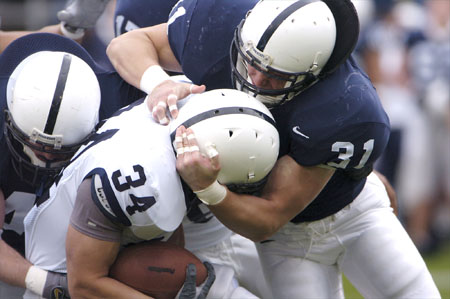Why you shouldn't be afraid of offending others and racking up a few penalties
 Sports doesn't always parallel life, but here's one that's relevant for the season. Although penalties in football are usually looked upon as costly mistakes, they can actually be a good thing -- they demonstrate aggressiveness. Holding back your players into a passive, milquetoast attitude can be worse than racking up a half a dozen penalties. Aggressiveness also happens to be an important quality for technical writers, even if it also results in a few social penalties.
Sports doesn't always parallel life, but here's one that's relevant for the season. Although penalties in football are usually looked upon as costly mistakes, they can actually be a good thing -- they demonstrate aggressiveness. Holding back your players into a passive, milquetoast attitude can be worse than racking up a half a dozen penalties. Aggressiveness also happens to be an important quality for technical writers, even if it also results in a few social penalties.
My brother-in-law is a dedicated BYU football fan, and since moving back to Utah I've been watching the games. Last Saturday, BYU lost to Oklahoma in a 55 to 47 loss. BYU accrued more than a dozen frustrating penalties, especially our offensive line, which is supposed to be our strength. It seemed like the penalties were a large part of why we lost -- but perhaps not.
Tonight I heard a radio show with the BYU coach, Bronco Mendenhall. A caller asked him about all the penalties BYU racked up, and what he was doing about it. Bronco said he'd been reading a book by John Madden, who explained that penalties can be evidence of aggressiveness, which is good. You don't want to hold back your players so much that they lose their aggression. On the other hand, you don't want them so riled up that they get ejected from the game. There's a balance. But having some penalties is actually better than none.
We as technical writers can learn from this aggressiveness. To be a technical writer, you have to be aggressive in going after SMEs to get the information you need. SMEs will avoid you, speak too quickly, or be dismissive. As technical writers, we have to be tenacious and persistent, asking question after question, setting up meetings until the right people show up and deliver the right information, and so forth. Aggressiveness is a key quality in being a technical writer.
Of course we can go overboard and rack up excessive penalties, but if we're too soft-spoken and accommodating, not accumulating any penalties at all, we'll lose our game. The key to remember is that we should probably get a few penalties -- it shows that we're being aggressive. We may step on a few toes and offend some people (poking heads in offices at the wrong time, inviting too many people to too many meetings, copying senior management on unanswered emails, annoying SMEs with too many follow-up questions). But racking up a few penalties also means we're more likely to win the documentation game and produce better materials.


